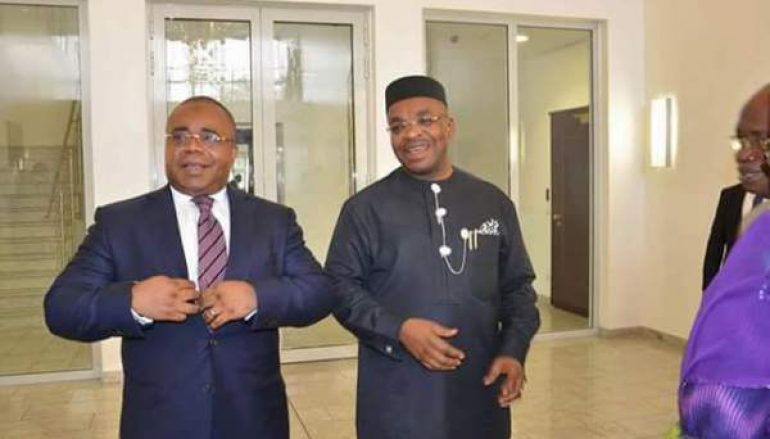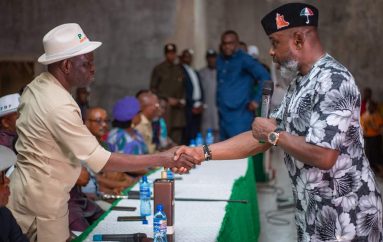
Udom, Umana Collaboration: The Instructive Lessons
By Joe Iniodu-
About a week after Obong Umana Okon Umana’s historic courtesy visit to the development oriented governor of Akwa Ibom State, His Excellency, Mr. Udom Emmanuel, many lessons and concerns have emerged from that event. While many have hailed the visit and proceeded to recommend it as standard political template that should be internalized, the cynical ones see it as a treacherous act on the part of Obong Umana. Yet others see it as a scheme on the latter’s part to lure the governor into losing his guard for Umana to deliver a political upper cut in the build-up to 2019. In all the hypothetical postulations, there are lessons to learn and circumspections to embrace.
The most critical and salient lesson that has arisen from this incident is the attitude of the supporters of principals and the need for circumspection. We come from a clime where we believe that the more insults, the more invectives we hurl at the perceived enemies of our principals, the higher our stakes in the hierarchy of importance, consideration and reward. With this mindset, most of us throw caution to the wind and freely unleash insults of libelous hue on political figures. The fickle assumption of those who engage in this morally unethical conduct is that their bosses or principals would see them as courageous and so reward them accordingly. But this is not often the case.
Perhaps it is pertinent to observe that courage has nothing to do with rascality or unethical behavior. Respect for elders is still a fundamental moral capital of universal constance. Insulting elders therefore remains a condemnable and contemptible act. When you therefore undertake to insult an elder or a coveted office in the belief of impressing your boss, you are merely exposing yourself as having a tacky upbringing. At that point, the principal sees you as an expendable item that he or she must barely tolerate for reasons of expediency. In other words, your role of insulting people ostensibly on behalf of the principal is merely tolerated to the extent of the momentary validity of that act.
It is trite knowledge that the principals meet and discuss at very congenial atmosphere without the hatchet men who do all the dog fights. They meet to share banters and review the undercurrents. At that point, the roles of various persons are isolated with animosity likely to build depending on the role one played. I dare to say that at such point, it is to thy tent on Israel, God for us all as your principal would deny you if your hue of insult is too damning for him to defend. Every man accounts for his inputs and takes responsibility accordingly, but note, without opportunity for self defence. There lies the dilemma of playing the hatchet man’s role without the hope of opportunity to defend and explain why one played such role.
Journalists and aides to the principals are often the ones who fall prey and are victims of these elites’ interest and disagreement. Some journalists who are co-opted by political elites believe that their role is to vilify anyone that is against their supposed paymaster. To achieve the objective of this not so noble acts, they surrender their papers as platforms that deal with matters that would make “Oga” happy including raking up mud that would submerge their principal’s enemies. But in doing this, they fail to realize that readership is being alienated and that such papers are losing professional and ethical values. The aides don’t fare better either. Often times, they engage in physical brawl in the wanton illusion of serving the master. They end up making enemies and injuring their relationship with many people.
My belief is that one can support one’s principal without insulting people and picking up quarrels. For those who were abusing Udom purportedly on behalf of Umana and vice-versa, did they ever figure out that the two can share platforms again and laugh together? Did they ever think the two could exchange telephone calls? Did they ever think that either of them could seek the good of the other at-least for the interest of Akwa Ibom and its people? But today all of these are in currency to the chagrin of those who worked in keeping them in dichotomy. My Counsel to journalists and aides that work for different principals is that they can deliver efficient and effective service without being in anybody’s bad book as insolent persons who do not abide by our standard ethical behavior of respect for elders and constituted authority.
Even though the scripture posits that one cannot know a man’s heart from the construction of his face, I share the sentiments that Obong Umana should be given the benefit of that doubt but not without circumspection by the governor. This is against the background of the argument that since many perceive him as an unforgiving person, his sincerity with Udom may be suspect. Others however see him as an hounourable man whose renewed spirit of camaraderie with the governor is informed by his love for the State. Being a major beneficiary of the State from his time as a civil servant to when he began to be buffeted with political appointments, Umana cannot but love a State that has made him who he is today. It is therefore not awkward to believe that he wants to collaborate with Udom to bring some of the visions he had nursed for the State to fruition.
While not discountenancing the fear of many who think that Umana’s intention is to lull Udom into a false sense of security to prevent him from clinching the office in 2019, we think it is time we separate politics from service but not without remaining guided. Umana must do his level best in terms of sincerity to disappoint those who are cynical towards his overtures to Udom. Governor Udom also must remain open minded and receptive in his interaction with Obong Umana and the management of OGFZA to pave way for Akwa Ibom and its people to benefit from the enormous potentials this collaboration would bring.
It is our considered belief that fate has brought the two together for the benefit of the State. Those who are seeking political capital from their dichotomy should consider the overall interest of the people and align their interest in the corridor of that public good. Politics which engender collaboration for public good is what we demand, not selfish politics of appropriating offices and procuring power for power sake.
Joe Iniodu is a public affairs analyst

 List of Newly Elected Chapter Officers
List of Newly Elected Chapter Officers  Inauguration of Newly Elected Ward Executive Officers
Inauguration of Newly Elected Ward Executive Officers  Gov Emmanuel Dedicates Victory To God, Akwa Ibom People
Gov Emmanuel Dedicates Victory To God, Akwa Ibom People  Paul Ekpo: A Harvest Of Mercurial Performance
Paul Ekpo: A Harvest Of Mercurial Performance 


